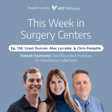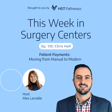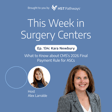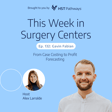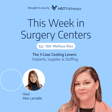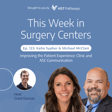
Erica Palmer – 10 News Stories Shaping the ASC Industry
As we reach the midpoint of 2023, it's the perfect time for us to reflect on the year so far and anticipate what lies ahead in the second half. In this episode, we will dive into ten noteworthy news stories that have been making waves in the ever-evolving surgery center industry. Here’s what to expect:
Top 25 healthcare companies: Fortune 500: UnitedHealth Group tops the Fortune 500 list with $324 billion in revenue for 2022. Other familiar faces help to round out the top 25.
New York extends Medicaid, CHIP postpartum coverage: What does this mean for the country’s healthcare spending and the growing pressure on Medicaid?
Improve Patient Safety with Clinical Technology: ASCs that are investing in clinical technology are seeing increased patient satisfaction scores and patient safety rates.
Where 5 major ASC chains are focused in 2023: What do USPI, SCA, HCA, Surgery Partners, and ValueHealth have planned?
5 highest-paying physician specialties in the last 5 years: Which physician specialties paid the most in the last five years? Hint: the specialty that paid the most in 2018 and 2023 is the same.
3 Quick Tips to Easily Strengthen Your Patient Relationship: Building the patient-provider relationship will be key to your ASC’s long-term success (and ability to collect).
Selling your ASC? 3 steps to improve valuation: ASC management groups, health systems, and private equity firms are planning aggressive ASC expansion strategies. Make sure you sell for top dollar.
AMA takes on AI, Medicare payment at annual meeting: The American Medical Association’s annual meeting took place two weeks ago in Chicago. Here are three of the highlights.
Cybersecurity Incidents: The Hidden ASC Operating Expense: By the end of 2023, it is projected that the total global cost of Cybercrime will reach $8 trillion. Here’s how to prepare.
North Carolina woman becomes a mom and doctor in the span of 24 hours: A woman from North Carolina became a mom and a doctor in the span of 24 hours. Congrats, Dr. Bailiff!
Brought to you by HST Pathways.



